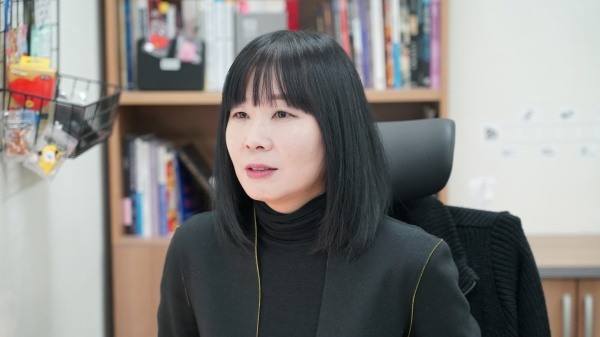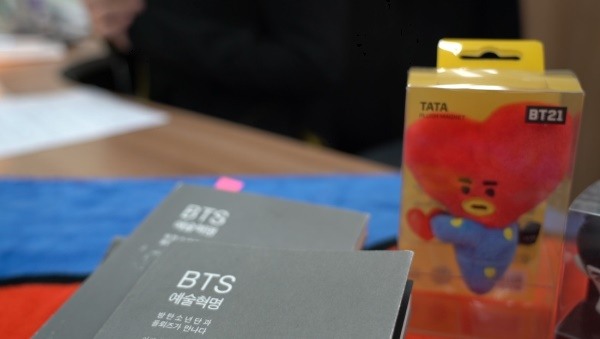Home > Music
[INTERVIEW] ‘BTS’ spirit cannot be duplicated’
 |
| BTS at the Grammy Awards. (Yonhap) |
Their short speech centered on thanking their loyal fans for making their long-held dream of standing on the Grammy stage come true. The members, during interviews with US media, were not shy in expressing gratitude, saying “they made us,” in a nod toward the distinctive relationship between the band and its global fandom, known as Army.
“BTS’ stage appearance at the Grammys, with their (Korean-language) song ‘Fake Love’ was a historical moment,” Lee Ji-young, who teaches philosophy at Sejong University, told Kpop Herald. “The fact that BTS was nominated at the historically conservative Grammys itself is a meaningful start. And BTS’ Korean-language tracks piercing into the US signals a transformation and growing diversity in the English-language dominated music industry.”
How did BTS break into uncharted territory?
Lee, the author of 2018 book “BTS, Art Revolution” and also an ardent BTS fan, thinks the band’s unique spirit, backed up with the members’ sincerity, is what makes the septet stand out among other K-pop groups.
 |
| Professor Lee Ji-young of Sejong University speaks during the interview with The Kpop Herald. (Yoon Yeun-jung) |
Their sincerity can be observed through members daily lives, how they interact with each other, expressing opinions honestly and helping and caring for each other and fans, that are all shown on videos, live-broadcast and social media posts they publish almost everyday. Through the lyrics, they are not afraid to make political statements, which is a rare freedom in the K-pop industry known for cookie-cutter idol bands churned out by big agencies.
“BTS reads and thinks a lot,” she said. “As a philosophy professor, I always contemplate how to make students and people read books and think, and it’s difficult. But BTS did that.”
When BTS members disclosed a book list that inspired their music, fans, as well as people who are curious behind BTS’ meteoric success, ran to bookstores to read the band’s selection. The list includes Hermann Hesse’s “Demian,” Milan Kundera’s “The Unbearable Lightness of Being” and Ursula Leguin’s “The Ones Who Walk Away from Omelas,” to name a few.
“Fans begin to read this books to find hidden meanings and stories of BTS’ music videos and songs that are all linked together,” she said. “BTS motivates fans to ponder and think deeper.”
She hopes more K-pop bands will read and take time to be informed of current issues. “K-pop Idol groups must read, think why many people are so distressed, watch news to see what is going around in the world,” she said. “When they are aware of people’s needs and desire, and why many suffer pain, more meaningful lyrics can be written. Practicing dance choreographies is important, but reading books and becoming decent artist is also critical.”
In the book “BTS, Art Revolution,” Lee highlights the band’s unique relationship with global fandom Army as one of major factor behind BTS’ popularity that transcends border. She, being a Gilles Deleuze scholar, describe the relationship as rhizomatic.
 |
| Lee's book "BTS, Art Revolution" and merchandise of BT21 -- a collection of characters created with BTS members. |
Rhizome is a philosophical concept developed by French philosopher to roughly indicate a horizontal, nonhiearchical network that is interconnected, like plant rhizomes, root systems some plants use to propogate themselves.
“But not all relationship that does not have a defined center are rhizomatic,” she said, adding the network has to show this Deleuze’s concept of “becoming-minoritarian,” which means assimilating with minority. When the participants of the relationship shares that idea of “becoming-minoritarian, it has revolutionary potential that triggers to band together and fight against the majority, or the established system in respective areas.
She added BTS, coming from small agency Big Hit Entertainment, was a minority in the K-pop league dominated by heavyweights like SM Entertainment, YG Entertainment and JYP Entertainment. The members are all from cities other than Seoul, in capital-centric Korea, while they sing Korean-language songs in a largely English-speaking and US-dominated global music industry.
“In the beginning, Armies were upset and furious that BTS was mistreated and received less recognition, despite the band’s musical talents and endeavors,” she said.
BTS fans feel like they are inter-connected with the band members like friends and helpers who share an equal relationship and walk the same journey. This means BTS’ success is their achievement, while the reverse is also true. The global fans -- diversely ranging from teenagers to people in their 70s, and people with high social status to social minorities including LGBT people -- deeply connect BTS’ underdog days with their own oppression and struggles, which many faced at some point in society, despite their social status. The struggle and resistance, however, also strengthened the solidarity within the fans, as well as with the band.
This horizontal, reciprocal relationship also defines how BTS communicate with fans via social media. When the band releases different music videos, short films and images online, fans go onto recreate and interpret the materials in diverse and creative ways. Lee used the term “Network-Image,” the term she coined in 2011 to explain the change of art production, especially in video arts, where there isn’t one single creator and others consume the artwork, but everyone can participate in creating an artwork in an open network.
“Everyone is a user, creator and also a consumer in this network,” she said.
Lee said she is also adopting a “rhizomatic” method when publishing her book “BTS, Art Revolution” in English in March or early April.
The translation is done by four people that include two Korean Armies, who also operate BTS’ translation accounts -- the social media account that is responsible for translating BTS-related content into different languages -- while it will be released in both paper book and digital format.
By Ahn Sung-mi and Yoon Yeun-jung (sahn@heraldcorp.com) (kairos07@heraldcorp.com)




























